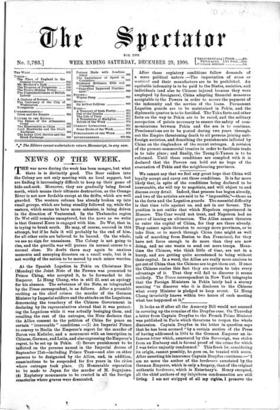We cannot say that we feel any great hope that
China will loyally accept and carry out these conditions. It is far more likely that, in spite of the conditions being declared to be irrevocable, she will try to negotiate, and will object to and discuss every detail. Indeed, that process has begun already, and two of the articles are said to be "impossible,"—those as to the forts and the Legation guards. The essential difficulty is that time tells against us, and not in our favour. The position is not unlike that which Napoleon experienced in Moscow. The Czar would not treat, and Napoleon had no power of issuing an ultimatum. The Allies cannot threaten to enter the capital of China, for they are there already. They cannot again threaten to occupy more provinces, or to take Sian, or to march through China (one might as well talk of marching from Boston to San Francisco), for they have not force enough to do more than they are now doing, and no one wants to send out more troops. Mean- time the Chinese, who think little of time, are not in a hurry, and are getting quite accustomed to being without their capital. In a word, the Allies are really more anxious to get out of China than the Chinese are to get them out. If once the Chinese realise this fact they are certain to take every advantage of it. That they will fail to discover it seems unlikely. The Times correspondent in New York telegraphs that the Foreign Ministers in Pekin lately had a stormy meeting "to discover who it is discloses to the Chinese what every Minister is pledged to keep secret. Li Hung Chang invariably knows within two hours of each meeting what has happened at it."


































